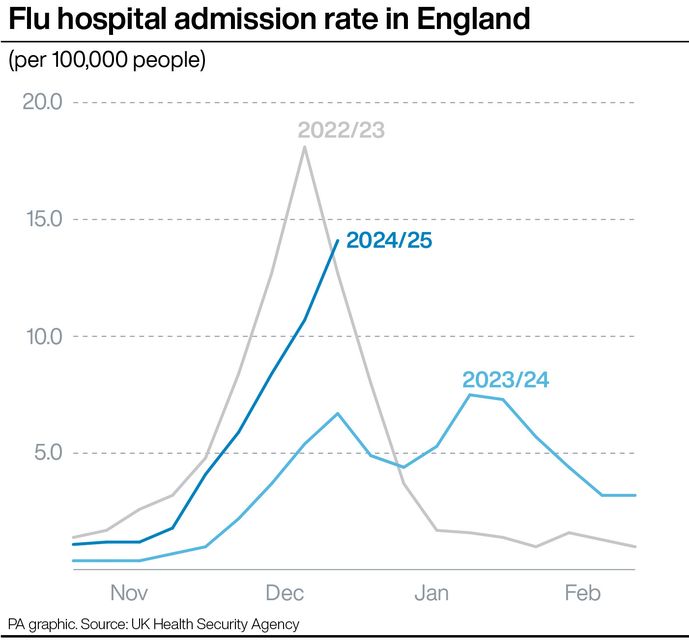A number of NHS trusts in England have declared critical incidents amid “exceptionally high demands” on emergency departments.
One trust said it is seeing “high numbers of older patients with respiratory problems exacerbated by the cold weather”.
Experts said this flu season is the “straw that is breaking the camel’s back” when it comes to urgent care.
We need your consent to load this Social Media content. We use a number of different Social Media outlets to manage extra content that can set cookies on your device and collect data about your activity.
Non-urgent patients have been warned they will face long waits in A&E and have been urged to “consider other options”, such as contacting their GP, visiting a pharmacy or calling NHS 111.
Hampshire Hospitals NHS Foundation Trust and University Hospitals Plymouth NHS Trust declared critical incidents on Tuesday morning, while NHS University Hospitals of Liverpool Group declared a critical incident at the Royal Liverpool University Hospital on Monday evening.
Critical incidents can be declared when health and care services are so busy that special measures are needed to restore normal operations and keep patients safe.
In a series of posts on X, formerly Twitter, Hampshire Hospitals NHS Foundation Trust said: “Due to sustained pressures at our Basingstoke and Winchester hospitals, we have declared a critical incident.
“Our emergency departments are facing extremely high attendance levels. Non-life-threatening conditions will result in long waits.”
A statement on the trust’s website added: “This decision has not been taken lightly; however, beds across both hospitals are full and attendance at our emergency departments is extremely high, which means there is currently no capacity to admit further patients needing our care.”
It urged people to “consider other options” for non-urgent medical care, such as calling NHS 111, contacting their GP, or going to a pharmacy or urgent treatment centre.
University Hospitals Plymouth NHS Trust said it declared a critical incident “due to significant and rising demand for hospital care”.
A statement on the trust’s website revealed more than 300 people attended Derriford Hospital as emergencies on Monday, with almost 200 of those admitted for care as inpatients.
“We are particularly seeing high numbers of older patients with respiratory problems exacerbated by the cold weather,” it added.
“Our emergency department is currently very full and if you do not have an emergency or life-threatening condition, you may be redirected to other healthcare services.”
NHS University Hospitals of Liverpool Group placed the Royal Liverpool University Hospital in a critical incident on Monday.
A spokesperson said: “Given the exceptionally high demands on our emergency department, especially with flu and respiratory illnesses, and the number of patients we have taken this action to support the safe care and treatment of our patients, which is our absolute priority.
“We are working with partner organisations to ensure those that are medically fit can leave hospital safely and at the earliest opportunity.”
Elsewhere, a critical incident declared by NHS Cornwall and Isles of Scilly on Friday continues.
The integrated care board thanked residents and said winter bugs, including flu, are impacting patients and staff, with services continuing to be busy.
Last week, NHS data revealed the number of people in hospital with flu in England was more than four times the level it was a month ago, with officials warning cases are “rising at a very concerning rate.”
Dr Adrian Boyle, president of the Royal College of Emergency Medicine, told the PA news agency that this flu season is the “straw that is breaking the camel’s back”.
“This flu season is not an outlier, but the problem is our emergency care system is so overwhelmed and fragile that a normal flu season – which is what we’ve got at the moment – is creating severe operational difficulties,” he said.
(PA Graphics)
“And it would be a mistake to think that this is solely a result of winter viruses. We have been chronically overloaded and overwhelmed for a number of years.
“It is a significant flu outbreak, but the problem is there’s just no capacity to deal with it. So it is really a straw that is breaking the camel’s back.”
He added: “It’s important in terms of public safety that people seek help in the usual way.
“If they think they’re having an emergency, they should call 999. Likewise, they should try and contact their GP, or NHS 111.
“People will be seen but they may have long delays, either to be seen or if they need to be admitted, but we will try and do our absolute best to look after people.”
East Midlands Ambulance Service NHS Trust also declared a critical incident on Monday evening.
We need your consent to load this Social Media content. We use a number of different Social Media outlets to manage extra content that can set cookies on your device and collect data about your activity.
Elsewhere, a number of trusts posted on X to warn that their emergency departments were very busy, including Leeds Teaching Hospitals NHS Trust, Bradford Teaching Hospitals NHS Foundation Trust, Royal Devon University Healthcare NHS Foundation Trust, Croydon Health Services NHS Trust, Royal Surrey NHS Foundation Trust and Kingston and Richmond NHS Foundation Trust.
Meanwhile hospitals in Lincolnshire have urged people in the county to avoid travel where possible.
United Lincolnshire Teaching Hospitals NHS Trust said on X: “Our hospitals are already very busy with long waits in A&E. With multiple flood warnings and flood alerts in place across Lincolnshire, please do not travel if you can avoid it.”
